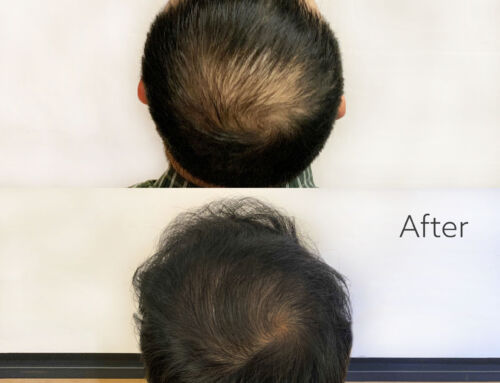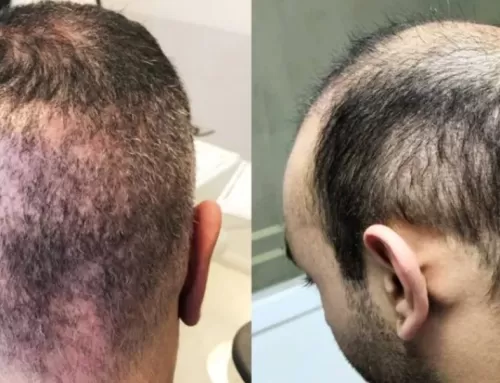Guest post by Sarah Mannion
Since she had been born, my mother was ‘blessed’ with her mother’s hair. It’s very thin, has little to no strength or volume and now at the age of 59, it continues to discourage, disappoint and degrade her self-confidence. Throughout her life, the constant devastation of her thinning hair and life altering behaviors (like the refusal of getting her hair wet at the beach on Cape Cod or never learning how to pump her own gas as she was petrified the wind would create a bald spot), my mother finally sought out treatment about 15 years ago. Hair loss affecting women is an extremely devastating condition. It manifests much differently in women than that of men’s. Underlying conditions play a much greater role in women’s hair loss. There’s no pattern to the hair loss and unfortunately, it can start at any age. According to the Academy of Dermatology, 40% of women suffer from hair loss prior to the age of 40 and sadly, 24% of women who suffer from hair loss would compare the emotional toll to that of a loss of a limb.
Common Causes
A woman’s physiology is known to be that much more complex than a man’s. Between menstrual cycles, pregnancy, menopause, and other conditions that go along with such awe-inspiring physiologic changes, the woman’s human body is a warrior. However, being the fighters that women are, it does come with downfalls. Common causes of hair loss in women are:
- Birth control
- Iron deficiency
- Hormonal imbalances
- Poor nutrition
- Extreme stress
- Various hairstyles i.e. extensions, dying the hair
- Medications
- Crash dieting
The American Academy of Dermatology says that most people lose anywhere from 50-100 strands of hair per day and on days where it’s washed, about 250 strands. It’s not suggested to actually count each individual strand but be conscious of when to ask a medical professional if you become concerned. If you feel as if you’re losing much more than 250 strands per day, don’t hesitate to call your doctor. Losing your hair can be an underlying condition to another problem so don’t wait too long before contacting your physician.
Diagnosis
When it comes to diagnosing your hair loss, the specific cause may take a little time find. The reason being is because compared to men’s hair loss, where about 90% of cases is caused by hereditary, hair loss in women can have multiple culprits. The key? The process of elimination. Chances are your doctor will order a wide variety of diagnostic tests first to cross off possible conditions that could be causing your hair to thin and fall out. A couple examples of the potential diagnostic tests include:
- Complete Blood Count
- Thyroid levels
- Iron levels
- Hormone levels
- Scalp biopsy
- Hair pull
The degree of hair loss will also be examined by your hair loss specialist. Two of the most common and universally known hair density scales are the Ludwig Scale and the Savin Scale. The Ludwig Scale ranges from stage 1 to stage 3 with stage 3 showing the most amount of hair loss or when hair loss has progressed past the crown of the head. With the Savin Scale, although both scales are almost identical, overall thinning is also measured on top of the actual loss of hair.
Treatment options
The good news? Treating your hair loss is possible, it just requires a little bit of patience. Non-surgical treatments as well as surgical treatments are available and completely up to your discretion. Non-surgical treatment options include Rogaine, Propecia, Laser Hair Therapy, and Platelet Rich Plasma. Surgical interventions include Follicular Extraction and Transplantation, Strip surgery or Follicular Unit Transplant (for rare and more severe cases). The surgical route is much Each treatment serves it’s own purpose based on your particular case but not all treatments would be recommended. Having a conversation with your physician to weigh the pro’s and con’s of each is highly suggested in order for you to receive the best possible outcome with the most natural looking results.
I remember my mother being overcome with such tranquil relief when she came home from her first appointment. She came in the door with puffy eyes and a stuffy nose from crying. This was what she had been searching for her entire life and my father never once denied her of such opportunity. He knew how strongly her hair loss affected multiple aspects of her overall quality of life. If you feel as if your hair loss continues to progress, give NE Hair a call to schedule a consult. It’s a hard first step. It’s completely traumatic to suffer from losing your hair but don’t let your hair loss control your life. Our experienced team is here for you. Visit us at NEHair.com or give us a call today at 774-643-6126.






